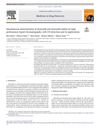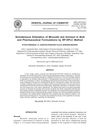 110 citations,
August 2016 in “Drugs”
110 citations,
August 2016 in “Drugs” Minoxidil is the only FDA-approved topical drug for treating male or female pattern hair loss, and other medications like finasteride and dutasteride can also increase hair growth.
 8 citations,
January 2016 in “Evidence-based Complementary and Alternative Medicine”
8 citations,
January 2016 in “Evidence-based Complementary and Alternative Medicine” Rumex japonicus extract may promote hair growth more effectively than Minoxidil.
 4 citations,
May 2020 in “Medicine in Drug Discovery”
4 citations,
May 2020 in “Medicine in Drug Discovery” The study developed a method to detect minoxidil and its sulfate form, found that minoxidil sulfate is temperature-sensitive, and identified a way to potentially increase its stability for hair loss treatment.
 5 citations,
January 2015 in “Journal of clinical & experimental dermatology research”
5 citations,
January 2015 in “Journal of clinical & experimental dermatology research” MorrF improves hair growth better than minoxidil alone.
 92 citations,
June 2010 in “Journal of The American Academy of Dermatology”
92 citations,
June 2010 in “Journal of The American Academy of Dermatology” Dutasteride 0.5 mg daily improves hair growth safely in men with hair loss.
 August 2023 in “JAAD International”
August 2023 in “JAAD International” Low dose oral minoxidil is generally safe and can improve hair loss in women, with some experiencing side effects and minimal blood pressure changes.
 14 citations,
April 2019 in “International Journal of Women's Health”
14 citations,
April 2019 in “International Journal of Women's Health” Some treatments can stabilize Frontal Fibrosing Alopecia, but more research is needed to find effective treatments, and hair transplants often fail.
 16 citations,
January 1995 in “Skin Pharmacology and Physiology”
16 citations,
January 1995 in “Skin Pharmacology and Physiology” SEPA™ enhances the effectiveness of minoxidil in stimulating hair growth, working faster and better than Rogaine® TS, with no significant side effects.
 November 2023 in “Journal of Cosmetic Dermatology”
November 2023 in “Journal of Cosmetic Dermatology” Oral minoxidil is more convenient but topical minoxidil improves hair density better.
 19 citations,
June 2020 in “International Journal of Dermatology”
19 citations,
June 2020 in “International Journal of Dermatology” Low-dose oral minoxidil effectively treats non-scarring hair loss with some side effects like hypertrichosis and postural hypotension.
 26 citations,
June 1983 in “Journal of Hypertension”
26 citations,
June 1983 in “Journal of Hypertension” Minoxidil lowers blood pressure more effectively but has more side effects, so try hydralazine first.
 28 citations,
May 1994 in “The Journal of Urology”
28 citations,
May 1994 in “The Journal of Urology” Topical minoxidil not effective for erectile dysfunction treatment.

Oral Minoxidil could be a safe and effective alternative treatment for various non-androgenic alopecias.
 145 citations,
November 2017 in “Journal of The European Academy of Dermatology and Venereology”
145 citations,
November 2017 in “Journal of The European Academy of Dermatology and Venereology” Use minoxidil for hair loss treatment; assess results after 6 months.
January 2025 in “Dermatologic Therapy” Low-dose oral minoxidil may help with symptoms and hair regrowth in lichen planopilaris without serious side effects.
 61 citations,
March 1981 in “Circulation”
61 citations,
March 1981 in “Circulation” Minoxidil improves blood flow in heart failure patients.
 1 citations,
May 2007 in “International Journal of Dermatology”
1 citations,
May 2007 in “International Journal of Dermatology” Minoxidil, when applied to the scalp, can stimulate hair growth but effects vary, stop if treatment ends, and it may cause side effects like fluid retention.
 12 citations,
August 2017 in “Archives of Pharmacal Research”
12 citations,
August 2017 in “Archives of Pharmacal Research” Lecithin-based microparticles can deliver minoxidil for hair growth effectively with less skin irritation.
 December 2024 in “Journal of the American Academy of Dermatology”
December 2024 in “Journal of the American Academy of Dermatology” Dermatologist visits offer safer and more ethical treatment for hair loss than direct-to-consumer platforms.
 39 citations,
November 1984 in “Journal of Cardiovascular Pharmacology”
39 citations,
November 1984 in “Journal of Cardiovascular Pharmacology” Minoxidil lowers blood pressure, increases heart rate, and improves blood flow in dogs.
 3 citations,
August 2021 in “Clinics in Dermatology”
3 citations,
August 2021 in “Clinics in Dermatology” Minoxidil is the main over-the-counter treatment for hair loss, with other options like finasteride, latanoprost, retinoic acid, antioxidants, biotin, nutraceuticals, and platelet-rich plasma therapy also showing promise.
 198 citations,
October 2011 in “Journal der Deutschen Dermatologischen Gesellschaft”
198 citations,
October 2011 in “Journal der Deutschen Dermatologischen Gesellschaft” Use minoxidil for hair loss; finasteride and dutasteride for men, dutasteride for women.
 July 2024 in “Pharmaceutics”
July 2024 in “Pharmaceutics” The new hydrogel treatment promotes faster hair growth and better skin health for hair loss.
 1 citations,
March 2015 in “Oriental Journal of Chemistry/Oriental journal of chemistry”
1 citations,
March 2015 in “Oriental Journal of Chemistry/Oriental journal of chemistry” A new method accurately measures minoxidil and aminexil in drugs.
 May 2023 in “International Journal of Trichology”
May 2023 in “International Journal of Trichology” Low-dose oral Minoxidil is an effective treatment for hair loss with minimal serious side effects.
 26 citations,
March 1985 in “International Journal of Dermatology”
26 citations,
March 1985 in “International Journal of Dermatology” Minoxidil helps hair growth, but results vary.
 48 citations,
December 2013 in “Drug Delivery and Translational Research”
48 citations,
December 2013 in “Drug Delivery and Translational Research” Niosomes improve minoxidil skin penetration for hair loss treatment.
 100 citations,
March 1973 in “American Journal of Cardiology”
100 citations,
March 1973 in “American Journal of Cardiology” Minoxidil effectively lowers blood pressure without major side effects.
 19 citations,
July 1983 in “American Journal of Kidney Diseases”
19 citations,
July 1983 in “American Journal of Kidney Diseases” Minoxidil lowers blood pressure in kids with kidney issues, but use carefully due to side effects.
 37 citations,
April 1979 in “The Journal of Clinical Pharmacology”
37 citations,
April 1979 in “The Journal of Clinical Pharmacology” Minoxidil effectively controls blood pressure but side effects may limit its use.





























